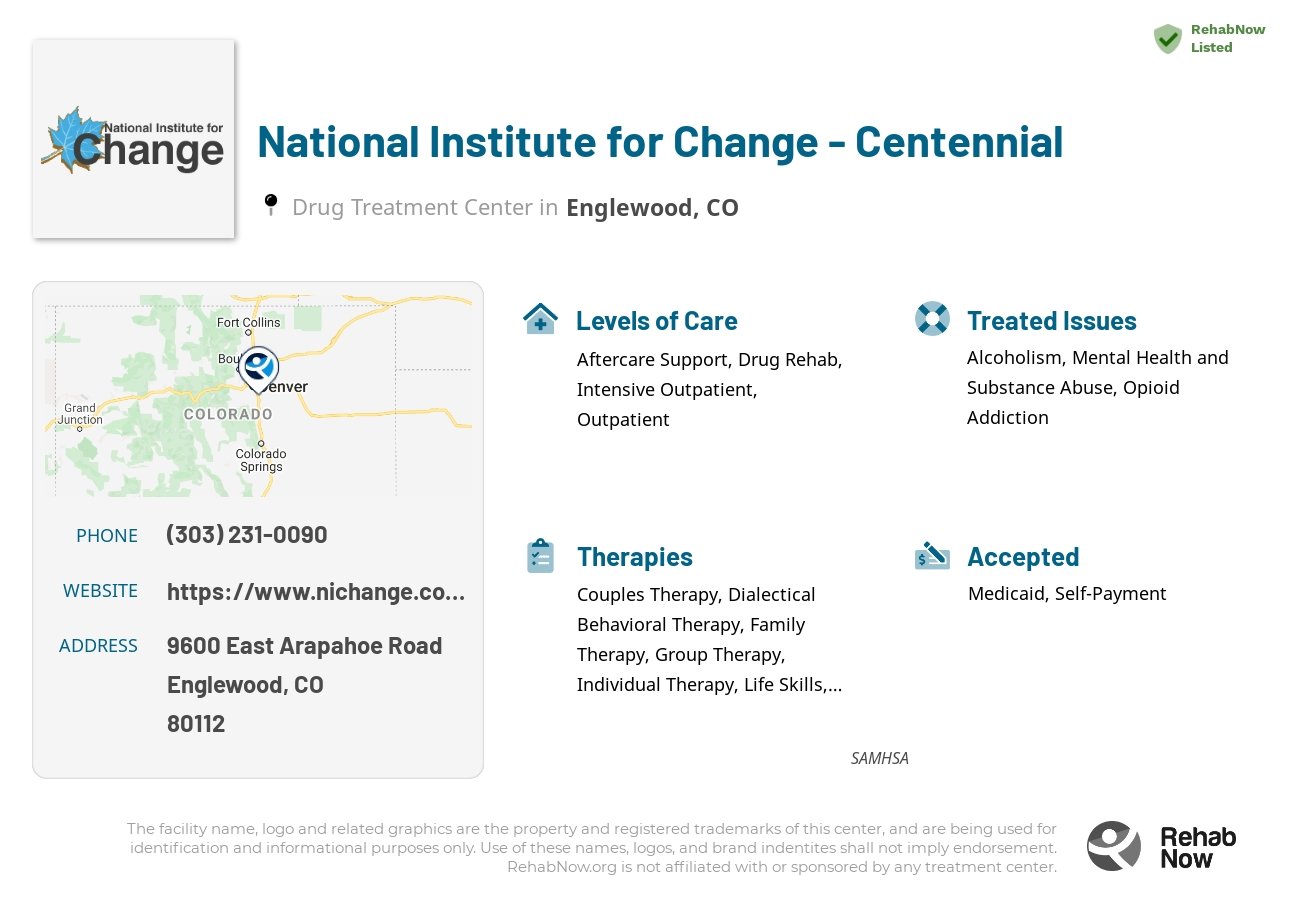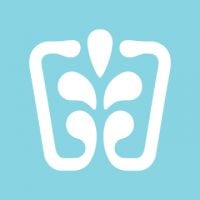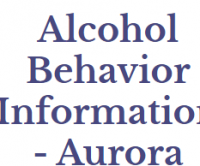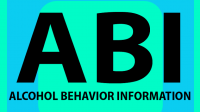National Institute for Change - Centennial
Drug Rehab Center in Englewood, Colorado
National Institute for Change - Centennial is an accredited addiction and substance abuse treatment center in Englewood, Colorado that provides evidence-based treatment services, psychological assessments, and aftercare support for individuals and families in the community.
About National Institute for Change - Centennial in Colorado
National Institute for Change - Centennial is a premier addiction and substance abuse treatment center located in Englewood, Colorado. The Institute is dedicated to helping local individuals and families in the community by providing an array of evidence-based treatment services, individualized care, and ongoing support. The Institute also offers psychological assessments and evidenced-based practices, including Dialectical Behavior Therapy, Cognitive Behavioral Therapy, and several evidence-based group therapies which focus on topics such as relapse prevention, life skills, and healthy coping.
National Institute for Change - Centennial specializes in substance use disorder with a focus on relapse prevention. They also provide treatment for co-occurring disorders such as anxiety and depression, as well as services for dual diagnosis conditions. In order to ensure effective treatment and long-term health and recovery, the Institute offers comprehensive and comprehensive aftercare services. This includes support and guidance for individuals in continuing their treatment and recovery process, even after completing their primary treatment program.
National Institute for Change - Centennial is accredited by the Joint Commission, an independent, not-for-profit organization that accredits and certifies health care organizations and programs in the United States. Additionally, the Institute is licensed by the Colorado Department of Public Health and Environment, and they are proud to have received the 2017 Outstanding Achievement Award from the National Association of Addiction Treatment Providers (NAATP). The Institute also offers numerous resources and support to families, including education and awareness activities, family counseling and therapy, and advocacy initiatives.
Genders
Ages
Modality
Additional
Accreditations
SAMHSA
Conditions and Issues Treated
Many people who struggle with opioid addiction need to attend specific programs like methadone , Suboxone or Vivitrol clinics.
These types of programs will provide the patient with legal, prescription medications that can help them overcome their cravings for illegal opioids like heroin or fentanyl . If the patient has a chronic condition like Hepatitis C, they must undergo treatment before they can begin taking these medications.
Levels of Care Offered
This center offers a variety of custom treatment tailored to individual recovery. Currently available are Aftercare Support, Drug Rehab, Intensive Outpatient, Outpatient, with additional therapies available as listed below.
An intensive outpatient program is usually the first phase of addiction treatment. It provides relief for those who are addicted, but are not ready to commit to an inpatient setting. Typically, the patient lives at home and is able to work or go to school. IOPs consist of a daily 3 to 5-hour program, and there is a required number of hours per week. Most patients go to IOP between 20 and 40 hours per week. The patient attends group counseling and individual therapy throughout the duration of treatment. They also meet daily with their therapist to discuss how it’s going and where they are in the recovery process.
The goal here is to teach patients healthy coping skills, such as stress management and identifying thoughts and behaviors that lead to relapse. The implementation of these skills will be useful as the individual transitions into the next phases of treatment.
An outpatient treatment program is set up to help with alcohol or drug addiction, or a co-occurring disorder. The patient must attend the Colorado facility for their therapy and other programs but are able to return home each night. The frequency of mandatory attendance decreases after much of National Institute for Change - Centennial‘s program is complete.
Aftercare is a term that’s used to refer to any sort of continuing care offered for a drug addict who has voluntarily entered a rehabilitation program. This type of care can be provided in several settings, including outpatient therapy sessions after the addict has completed an inpatient program. There are also 12-step support groups, such as Alcoholics Anonymous, which can provide additional help for addicts trying to stay sober.
Therapies & Programs
Individual Therapy is a critical component of addiction recovery. Therapists work with patients to identify the root of their addiction and figure out how to better handle the issues that led to them using drugs. Individual Therapy is the one-on-one session where people meet with their therapist. Individual therapy provides a safe space for people to open up and discuss personal and sensitive topics which they may not feel comfortable discussing in a group setting.
Couples therapy at National Institute for Change - Centennial focuses on addiction treatment for the addict and their spouse. The addict’s family, not just the addict, can benefit from this form of therapy. Couples therapy addresses communication problems, trust issues, lack of intimacy, and abuse in intimate relationships. Couples therapy can help rebuild trust between partners, which increases the chances for successful treatment and sustained recovery.
Intimate relationships can be damaged during addiction, and professional help may be necessary to rebuild the often destroyed trust and love. Couples therapy at National Institute for Change - Centennial helps couples improve communication and rebuild trust. Either or both partners will be helped by this treatment administered by professionals. This treatment can also help one or both partners if addiction is the problem.
Family therapy will also help families realize that the addiction is not their fault. For many years, people blamed themselves for an addict’s behavior and felt that they had done something wrong. This is not the case. Addiction is a disease, and it can strike anyone, even if their life seems fine from the outside. It can bring a lot of shame to a family when they have an addict in their midst, but if everyone is open and honest with each other, then they can help everyone stay in recovery.
Group Therapy is utilized by drug treatment centers like National Institute for Change - Centennial to provide the recovering drug addict with a platform to talk about their feelings and experiences. It also provides for an opportunity to learn from other addicts who have successfully overcome their addiction.
Group Therapy is employed in lectures, seminars, or discussion groups (the latter two are typically conducted as “therapy groups”). It is recommended that all group members be recovering addicts for this type of therapy to work (though it does not exclude others with lived experience).
Trauma therapy is a clinical process that helps individuals deal with mental stress often caused by traumatic events. It is generally done for children, teenage victims of sexual assault, and war veterans. The therapist helps the person identify, understand and work through the problem. This is done with the help of talking about it in group or one-on-one counseling sessions. Therapists use relaxation, role-playing, art, and music to help the person open up about what is bothering them.
Dialectical Behavior Therapy (DBT) is used by drug treatment centers across the United States to help drug addicts become sober. DBT combines traditional behavioral treatments with elements from DBT, including dialectics, distress tolerance, and interlocking issues. It is commonly used to treat Borderline Personality Disorder (BPD) along with substance abuse disorders. The four DBT modules are mindfulness, interpersonal effectiveness, emotion regulation, and distress tolerance.
Cognitive behavioral therapy is also a popular service for individuals living with addiction. This type of supportive treatment uses both one-on-one counseling and group sessions to teach addicts how to identify thoughts, behaviors and emotions that might increase their risk of relapse.
These professionals can help addicts develop coping skills for managing stress, improving self-esteem and overcoming triggers. They might also use behavioral therapy to help addicts learn how to avoid cravings and warning signs that could lead them back into addiction.
Therapy can be used as a step-down from inpatient treatment or as the primary method of overcoming an addiction. No matter which option is best for the addict, they will teach important emotional coping techniques, which can make it easier for addicts to get through the tough days.
Training in improved life skills helps those recovering from addiction feel more capable of self-care. National Institute for Change - Centennial are daily skills that give the person the tools they need to survive.
The therapy covers practical activities like cooking, job hunting, social interaction, and money management, helping to fill in the knowledge gaps caused by addiction.
These life skills help the person self-manage their recovery and stay on track. It also reduces relapse risk as they gain confidence in their day-to-day abilities.
Payment Options Accepted
For specific insurance or payment methods please contact us.
National Institute for Change Associated Centers
Discover treatment facilities under the same provider.
- National Institute for Change - Denver in Denver, CO
- National Institute for Change - Englewood in Englewood, CO
- National Institute for Change - Aurora in Aurora, CO
- National Institute for Change - Denver in Denver, CO
- National Institute for Change - Aurora in Aurora, CO
Learn More About National Institute for Change Centers
Additional Details
Specifics, location, and helpful extra information.
Englewood, Colorado 80112 Phone Number(303) 231-0090 Meta DetailsUpdated November 25, 2023
Staff Verified
National Institute for Change - Centennial Patient Reviews
There are no reviews yet. Be the first one to write one.
Englewood, Colorado Addiction Information
The Centennial State has slipped to a ranking of 12th in the country for drug abuse. Each year around 24% of the state's population uses illegal drugs while nearly 5% of its population abuses alcohol. Substance-related deaths in Colorado were responsible for 15.12% between 2008 and 2017. Fortunately, Colorado drug and alcohol addiction treatment are available to help a person overcome addiction.
In 2016, there were 577 opioid-related overdoses in Englewood, Colorado. Drug overdoses killed more than 64,000 men and women in 2016. Over 1,000 drug-related arrests were made in the past year. Nearly 2,000 people were admitted to local hospitals for issues related to drug abuse. There are several rehabilitation facilities in Englewood and the surrounding area.
Treatment in Nearby Cities
- Yuma, CO (120.0 mi.)
- Fairplay, CO (65.3 mi.)
- Arvada, CO (18.3 mi.)
- Cascade, CO (48.5 mi.)
- Idaho Springs, CO (35.4 mi.)
Centers near National Institute for Change - Centennial
The facility name, logo and brand are the property and registered trademarks of National Institute for Change - Centennial, and are being used for identification and informational purposes only. Use of these names, logos and brands shall not imply endorsement. RehabNow.org is not affiliated with or sponsored by National Institute for Change - Centennial.










